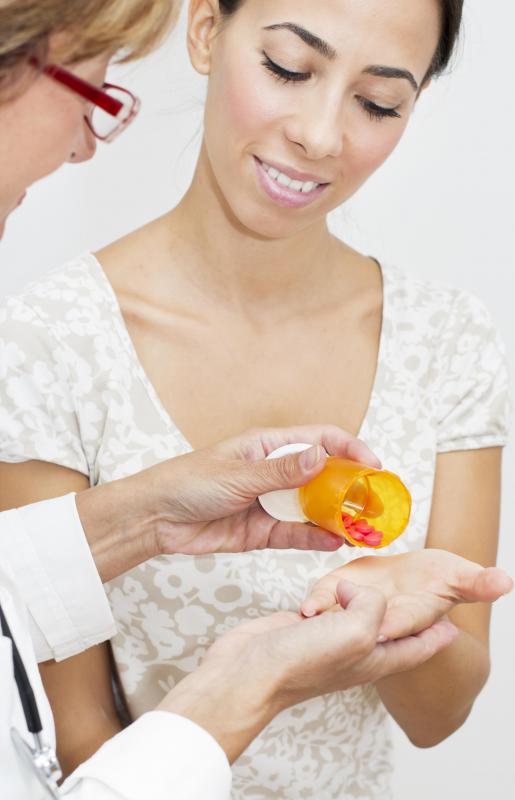At TheHealthBoard, we're committed to delivering accurate, trustworthy information. Our expert-authored content is rigorously fact-checked and sourced from credible authorities. Discover how we uphold the highest standards in providing you with reliable knowledge.
What are the Effects of Antibiotics on Menstruation?
The effects of antibiotics on menstruation are not completely certain, although some research has been conducted in the past in an attempt to determine if antibiotics affect the menstrual cycle. Many women who take antibiotics notice no differences in their menstrual cycles, while other women have noticed changes that they assume are the result of antibiotic use. The possible effects of antibiotics on menstruation may not be related to the antibiotics themselves, but rather to the infections that antibiotics are used to treat. Some women think that antibiotics cause heavier bleeding, delayed menstruation onset, and more severe cramping than normal, but these problems could be caused by infections, particularly if the infections involve the female reproductive system.
In the late 1940s, two British medical specialists did a study on the effects of penicillin, which is a type of antibiotic, on several women to see how it affected their menstrual cycles, if at all. Their findings were inconclusive, although several women who participated in the study did report some changes, including severe cramping and heavier bleeding than normal. Some women also noticed differences in when menstruation started and how long it lasted. Even though many women did notice differences, there were many women who did not, which may be why the study did not reveal much about the effects of antibiotics on menstruation.

There are several infections that occur in the reproductive system that antibiotics may be used to treat, and these infections might cause changes in menstruation. Some things that antibiotics are occasionally used for in women include vaginal infections and uterine infections. Antibiotics are also occasionally prescribed for certain types of yeast infections. Women who notice changes in their menstrual cycles who have infections inside their reproductive systems are most likely experiencing changes because of the nature of their infections rather than from the antibiotics themselves.

Even though the effects of antibiotics on menstruation are more than likely related to different types of infections rather than to antibiotics, any unusual changes should be reported to a physician. There is always a chance that certain antibiotics could cause changes inside the body that might affect the menstrual cycle. If changes in the cycle are very unusual and severe, a doctor may be able to help. If a doctor suspects that antibiotics are causing problems with menstruation, she will probably attempt to find another antibiotic to prescribe that her patient may not be as sensitive to.
AS FEATURED ON:
AS FEATURED ON:
















Discussion Comments
Antibiotics are not used to treat yeast infections. Often, taking antibiotics can cause yeast infections.
I have taken three types of antibiaotics, (noprilam, cefuroxime and moxiclav) in three weeks. My period was eight days late, so I took a pregnancy test after I was four days late, and it came up negative. Should I wait a few more days before I consult a doctor?
I have been through three courses of antibiotics in about a month's time. I got my period about two weeks ago and this morning I spotted a tiny bit. My boyfriend and I always use condoms, but I don't take birth control and was wondering if it was normal to experience spotting while on antibiotics. I'm sure going through three different antibiotics might have screwed up my hormone levels, but I was just wondering if anyone else has experienced this while taking antibiotics.
Something else to be aware of is that *any* sort of stress on your system, whether emotional or physical, can delay ovulation. Then unless you know when you ovulated, you will notice a late menstrual period; if you're sexually active, you might suspect pregnancy.
I've always been pretty regular, but one year I was moving at Christmas and very busy at work, and I did not ovulate at all that month or get my period. My sister went without her period for several months after she went off birth control pills. She had come down with a bad case of strep throat. (Which is weird, because although she is a teacher, it was summer and she was working from home and seeing practically no one!) She thinks that the stress of the infection and treatment may have delayed the return of her period even further.
I suggest that *all* women (unless they're on hormonal birth control) chart their menstrual cycles! By taking your BBT (basal body temperature) every morning until you are sure you're ovulated, you'll know much more precisely when your period is due. You can get more info by looking up the Fertility Awareness Method (FAM).
Something to be aware of is that antibiotics can affect your system if you are taking birth control pills! The evidence is spotty, but it's been reported that at least some antibiotics can lessen the effectiveness of your birth control pills. Most doctors and pharmacists will recommend using a backup method until the next cycle after you stop your antibiotics.
Post your comments